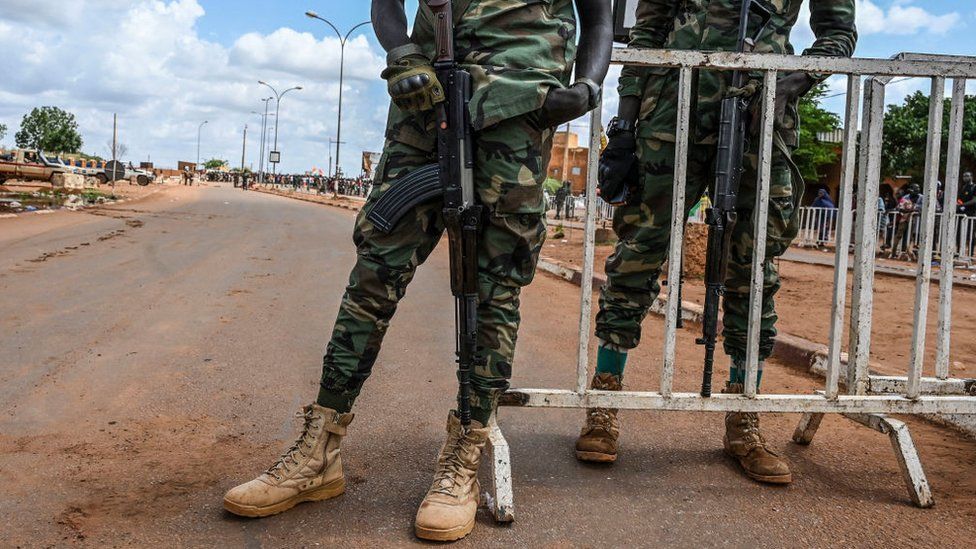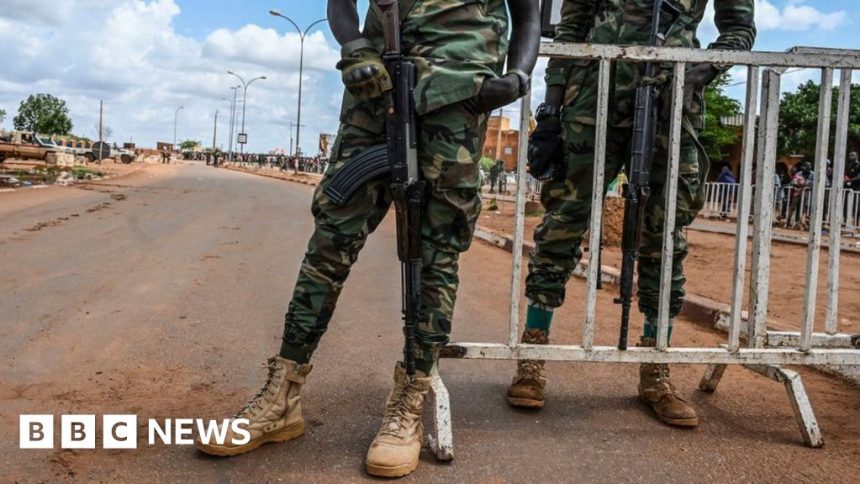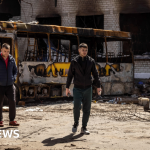Russian troops arrive in Niger as military agreement begins
-
Published

Dozens of Russian military instructors have arrived in Niger as part of a new agreement with the country’s junta, which has cut links with the West.
State media reported that they arrived along with a state-of-the-art air defence system.
They are expected to install the system and teach Niger’s army how to use it.
The West African country is one several in the Sahel region ruled by military authorities to have recently strengthened ties with Russia.
A spokesperson for Niger’s military government on Friday said the Russians were in the country to train soldiers.
The Russian Defence Ministry’s paramilitary group Africa Corps, also known as the Russian Expeditionary Corps (REK), wrote on Telegram that this was the first group of servicemen and volunteers to go to Niger.
In an attached video, a serviceman of the corps said in French that they were there to “develop military cooperation” between the countries and had brought “various special military equipment” to help with training.
Footage of the Russian instructors unloading a cargo plane full of equipment was broadcast on Niger’s state television.
Ulf Laessing, a specialist in the Sahel region for the Konrad Adenauer Foundation, which promotes democracy, told the BBC World Service’s Newsday programme that the military supplies appeared to be part of a “regime survival package”.
Niger’s democratically elected President Mohamed Bazoum was overthrown last year by the junta, which has since cut military and diplomatic ties with France – the former colonial power – and revoked an agreement with the US.
The European Union suspended its security cooperation with the country in the wake of the coup.
Mr Laessing said the military government was still concerned about some form of physical interference in Niger by the political and economic alliance of West African states, known as Ecowas.
He added that this is probably the reason for the supply of a Russian air defence system, rather than to help suppress Islamist fighters.
“I don’t have any other explanations because jihadists don’t have planes,” Mr Laessing said.
Kabir Adamu, of the intelligence organisation Beacon Security, said Niger was moving closer to countries outside the Western bloc including Russia, China and Iran. He said he feared the alliance with Russia could encourage the junta to further delay a return to civilian rule, as has happened in neighbouring Mali.
Abdel-Fatau Musa, Ecowas commissioner for political affairs, peace and security, noted that Niger was following in the footsteps of Mali and Burkina Faso – the three countries have formed a military alliance.
Niger had already been suspended from Ecowas – which has been urging the country to return to democratic rule along with Burkina Faso and Mali – but in January, the junta-led countries announced they would quit the bloc.
He expressed fears of a long period of conflict in the Sahel region.
“Our position is clear. We shall hold the country of origin responsible for any egregious human rights violations.
“We urge countries in the region not to facilitate another cycle of proxy wars in Africa,” Mr Musa told the BBC, although he said sovereign states had a right to choose their international partners.
Niger has been facing increased violence by the Islamic State group, as well as the continuing threat of Boko Haram militants along its border with Nigeria.
Earlier this week, at least six soldiers were killed in a blast in the Tillabery region near the border with Mali.
Niger’s defence ministry, which confirmed the attack, said an army patrol vehicle hit a landmine near the south-western village of Tingara earlier this week, killing some of the soldiers. Others were wounded and were taken to hospital.
The ministry said it had carried out an air strike to neutralise those responsible for planting the homemade landmine.
While the military government cited worsening insecurity in Niger as the reason for the coup, reports indicate that insurgents have continued to carry out attacks in parts of the country – almost on a monthly basis – especially in the Tillabery region.






